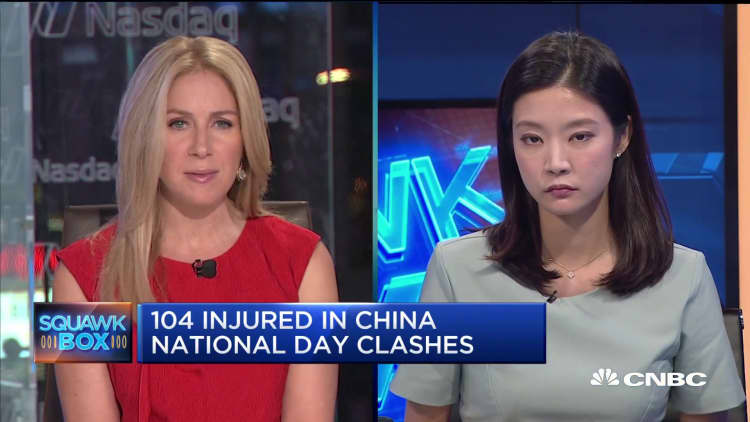
Hong Kong has reached a point of "no return," one strategist told CNBC on Thursday.
"There is no return to what Hong Kong was. I don't see the social situation being easily resolved, and I don't see it getting better. So my forecast is pretty gloomy," said David Roche, founder and strategist at research firm Independent Strategy.
On Tuesday, an 18-year-old protester was shot by a live bullet, amid violent brawls between the police and demonstrators on China's National Day.
"The police have become the enemy especially after the shooting of the young school boy," said longtime resident and business leader Allan Zeman. "They get provoked first and then of course they defend themselves."
While the shooting has further galvanized anti-government protesters against the police force, authorities maintain that the officer fired his weapon with the intention to stop, not kill. Multiple videos of the altercation show protesters carrying objects like wrenches and hammers.
While Zeman, has lived in the global financial center through the 1997 handover scare, the real estate mogul said this "earthquake" — the ongoing mass demonstrations — is different from the other tumultuous times he witnessed in the city.
"For Hong Kong to maintain its edge, we have to find a way forward," said Zeman, who has lived in the city for more than four decades and serves as an economic advisor to Hong Kong's Chief Executive Carrie Lam.
Impact on Hong Kong's retail and hospitality sectors
The Lan Kwai Fong Group chairman said the protests have hurt the retail and hospitality sectors the most because the clashes primarily happen on the weekend. Zeman pushed for the development of his group's eponymous nightlife and entertainment district.
On Wednesday, the Hong Kong government said preliminary August retail sales plummeted 23% year over year. A government spokesman said that drop was the worst since the 1998 Asian Financial Crisis. The spokesman cited lackluster economic conditions paired with "severe disruptions to inbound tourism and consumption-related activities caused by the local social incidents."
While demonstrations over a now withdrawn bill began peacefully in early June, demonstrations have increasingly turned combative in recent weeks.
On Tuesday, local police fired water cannons to break up the increasingly chaotic crowds outside government buildings and across the city. The city's underground rail system, MTR has been disrupted on multiple occasions by demonstrators in the last four months as violence escalates. Multiple Bank of China and China Telecom locations have been vandalized.
Hong Kong police said they arrested 269 people between the ages of 12 and 71 on Tuesday.
'The real problem'
Business tycoon Zeman said the "real problem" fueling the momentum in this movement is that "young people don't see chances for upward mobility" in Hong Kong. Compared with Singapore, the real estate mogul said home ownership is far more difficult in Hong Kong where salaries have stagnated in the world's most expensive housing market.
Independent Strategy's Roche agreed that if the Hong Kong government took some measures to increase housing affordability, tensions could potentially ease somewhat. He said, however, that too much damage has been done now.
"This is not going to stop the fact that things on the streets are getting worse, not better. And using bullets is certainly not going to send people home. And it'll bring more people out," said Roche.
A British colony until it returned to Chinese rule in 1997, Hong Kong now operates under the "one country, two systems" principle that grants citizens certain legal and economic freedoms not given in mainland China. Zeman argued that "China has not cut down on our freedom," explaining that when he lived in Hong Kong under British rule there was no avenue to contest the city's governance.
"A governor was sent out; no one had any chance to elect the governor who was sent out. You just accepted whoever came out," Zeman, businessman and economic advisor to Lam said.
"We still have 1,200 people in the nominating committee electing the chief executive. Whether it is right or wrong, it is the system in Hong Kong, and that represents all parts of society supposedly" he said, referring to Hong Kong's Election Committee.
Anti-government protesters criticize this system as favorable to pro-Beijing interests. They instead favor universal suffrage for electing Hong Kong's chief executive as well as members of the legislature.


